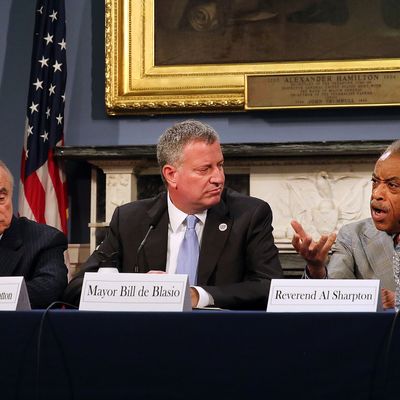
The word ironic is frequently abused and misused. But here’s a situation where it fits absolutely perfectly: The hallmark, and promise, of Bill de Blasio’s operating style is that he’ll be inclusive, that as mayor he’ll forge “one city” by bringing people together around a table and talking things out. And now that core de Blasio approach has helped stoke division instead of nurturing consensus. Ironic.
The mayor seemed to get off to a pretty good start in handling the controversy over the police-chokehold-triggered death of Eric Garner. De Blasio delayed his vacation to Italy and worked the phones to community leaders on Staten Island; administration aides attended Garner’s funeral; and police commissioner Bill Bratton promised a retraining of the entire police force.
But the contentious underlying issues — how to keep crime down while raising the level of trust between cops and minority New Yorkers — were never going to be resolved by a couple of weeks of posturing. And de Blasio seems to have underestimated the wariness of cops toward him after he made attacking stop-and-frisk a pillar of his winning campaign — and he definitely misread the eagerness of police union leaders to test him.
Then de Blasio put Al Sharpton in front of a bunch of TV cameras.
The Reverend claims he arrived at City Hall last week expecting only a private meeting. What should have surprised no one is that Sharpton, seated to de Blasio’s left with Bratton on the mayor’s right, used the spotlight to blast the NYPD. The police commissioner looked diminished; the mayor looked like he’d been reduced to a moderator. The fallout keeps getting messier: Today’s Daily News front page features internal PD finger-pointing over the focus on illegal cigarette sales that led to Garner’s arrest. The chief said to have given the order, Philip Banks, happens to be black.
De Blasio’s instincts are right, intellectually, that his experiment in recalibrating police tactics will take time, and that he can’t overreact to the Garner episode. Unfortunately, New York isn’t a particularly patient place. Events and vested interests are going to keep forcing the mayor to make tough choices, to take sides when he’d rather be in the middle. Progressive advocates are calling for the end of “broken windows” policing, but if de Blasio capitulates, he risks effectively losing Bratton. Yet if the mayor staunchly backs his police commissioner, he could antagonize his lefty political base. And de Blasio is operating in a tricky larger context: the classic skepticism that a liberal politician can maintain law and order.
Sharpton has called for a protest march from Brooklyn to Staten Island, across the Verrazano Bridge, on August 23. For much of his activist political career, de Blasio would have been at the front of the procession. Now he’s got to figure out how to be a man of the people while also being the Man.





























